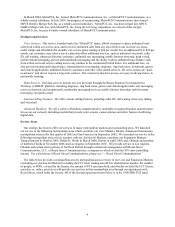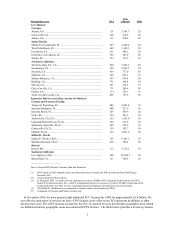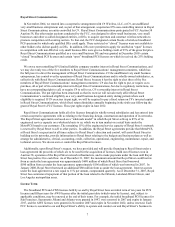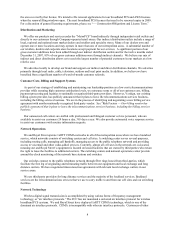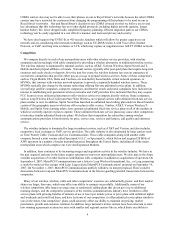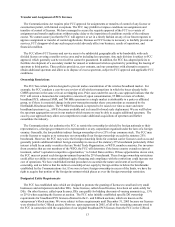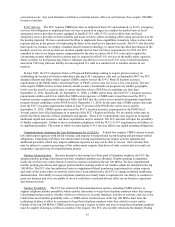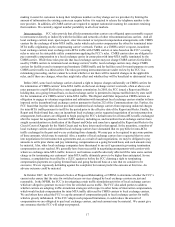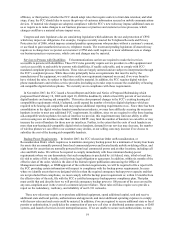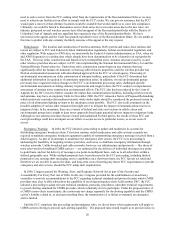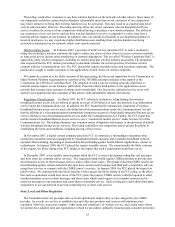Metro PCS 2007 Annual Report Download - page 25
Download and view the complete annual report
Please find page 25 of the 2007 Metro PCS annual report below. You can navigate through the pages in the report by either clicking on the pages listed below, or by using the keyword search tool below to find specific information within the annual report.14
auction, we are no longer required to comply with these requirements. However, we are an investor in Royal Street
which is a very small business DE and it must meet and continue to abide by the FCC’ s DE requirements.
Among other requirements, the FCC DE rules create a control test that obligates the eligible small or very small
business members of a DE licensee to maintain de facto (actual) and de jure (legal) control of the business and
license. The FCC rules provide that if a license is transferred to a non-eligible entity, an entity which qualifies for a
lesser credit on open licenses, or if the existing licensee ceases to be qualified as a DE, the licensee may lose all
closed licenses which are not constructed, and may be required to refund to the FCC some or all of the bidding
credit received for all open licenses, based on a five-year straight-line discount repayment schedule commencing
from the grant date. For example, in Auction 58, Royal Street received a bidding credit equal to approximately
$94 million relating to open licenses it acquired as result of that auction. If Royal Street were found to no longer
qualify as a DE during the initial five-year term of its licenses, it would be required to repay a portion of the bidding
credit using the five-year straight-line repayment schedule from December 2005. Moreover, any closed licenses
which are transferred by Royal Street prior to the five-year anniversary of their initial grant, or December 2010, may
also be subject to an unjust enrichment payment or revocation if not constructed. All of Royal Street’ s licenses are
closed licenses except the license for the Los Angeles and Gainesville basic trading area. Royal Street has already
constructed its closed licenses in the Orlando, Lakeland-Winter Haven, and Melbourne-Titusville basic trading
areas. Royal Street is party to certain grandfathered arrangements with us that cannot be extended to new or
additional licenses due to recent changes in the DE rules. For this reason, the ability of Royal Street to own or
control additional licenses in the future will be inhibited absent significant changes in our business relationship.
In 2006, the FCC adopted new DE requirements in a DE Order that applies to all licenses initially granted after
April 25, 2006. First, the FCC found that an entity that enters into an impermissible material relationship, which
includes any arrangement whereby a DE leases or resells more than fifty percent of the capacity of its spectrum or
network to third parties, will be ineligible for award of DE benefits and subject to unjust enrichment payments on a
license-by-license basis. Second, the FCC found that any entity which has a spectrum leasing or resale arrangement
(including wholesale arrangements) with an applicant or licensee for more than 25% of the applicant’ s total
spectrum capacity on a license-by-license basis will be considered to have an attributable interest in the applicant or
licensee. Royal Street is not subject to the new requirements with respect to its existing licenses which were granted
before April 25, 2006. However, these revised rules will not permit Royal Street to enter into the same relationship
it currently has with us for any future FCC auctions and receive DE benefits, including bidding credits. In addition,
Royal Street will not be able to acquire any additional DE licenses in the future, resell services to us on those
licenses on the same basis as the existing arrangements, or materially change the existing wholesale arrangements
with us, without making itself ineligible for DE benefits.
Further, the FCC has adopted rules requiring a DE to seek approval for any change in circumstances that may
affect its ongoing eligibility, such as entry into an impermissible material relationship, even if the event would not
have triggered a reporting requirement under the FCC’ s existing rules. In connection with this rule change, the FCC
now requires DEs to file annual reports with the FCC listing and summarizing all agreements and arrangements that
relate to eligibility for designated entity benefits. Royal Street has filed its annual reports with the FCC. The FCC
indicated that it will step up its audit program of DEs and audit the eligibility of every DE that wins a license in the
AWS auction at least once during the initial license term.
Several interested parties filed an appeal of the DE Order with the Court of Appeals for the Third Circuit which
the Court dismissed. The Petitioners and the FCC filed motions for rehearing, which were denied. The Petitioners
also filed a writ of mandamus with the Court of Appeals for the Third Circuit asking the Court to order a prompt
Commission ruling on a previously filed Petition for Expedited Reconsideration that remains pending before the
FCC, which the Court also denied, but ordered the FCC to file with the Court an estimate when it would act on the
Petitoner’ s Petition for Expedited Reconsideration. The relief sought by the petitioners in its underlying appeal
includes overturning the results of Auction 66. If the petitioners are ultimately successful in getting this relief, any
licenses granted to us as a result of Auction 66 may be revoked. Our payments to the FCC for the revoked licenses
would be refunded, but without interest. If our licenses are revoked we will have been required to pay interest to our
lenders on the money paid to the FCC for the AWS licenses and we will have incurred clearing and other expenses,
but would not receive interest or any compensation for our clearing and other activities on the spectrum. The interest
and other expenses, which could be substantial, may affect our results of operations and the loss of the Auction 66
licenses could affect our future prospects. We are unable at this time to predict the likely outcome of the challenges
to the DE Order or any further appeal and unable to predict the impact on the licenses granted in Auction 66. We
also are unable to predict whether the litigation will result in any changes to the DE Order or to the DE program,
and, if there are changes, whether or not any such changes will be beneficial or detrimental to our interests.


